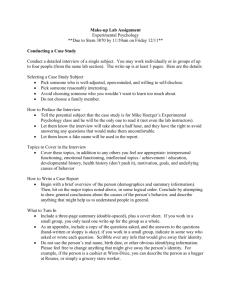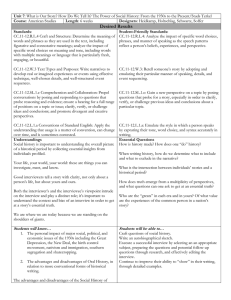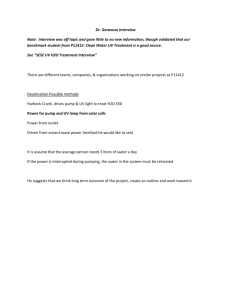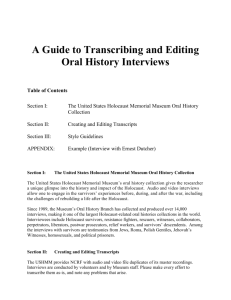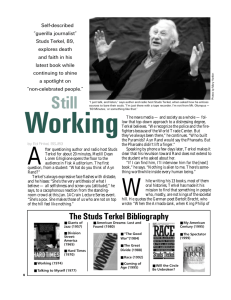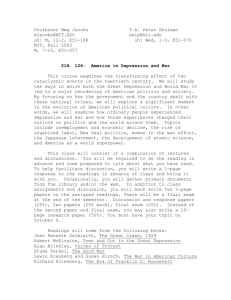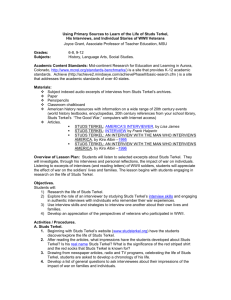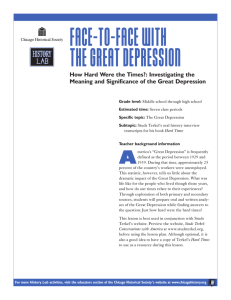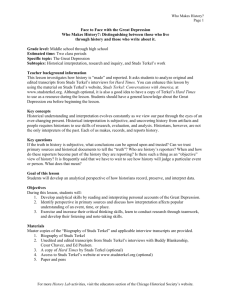Oral History Paper Studs Terkel is a notable historian whose work
advertisement
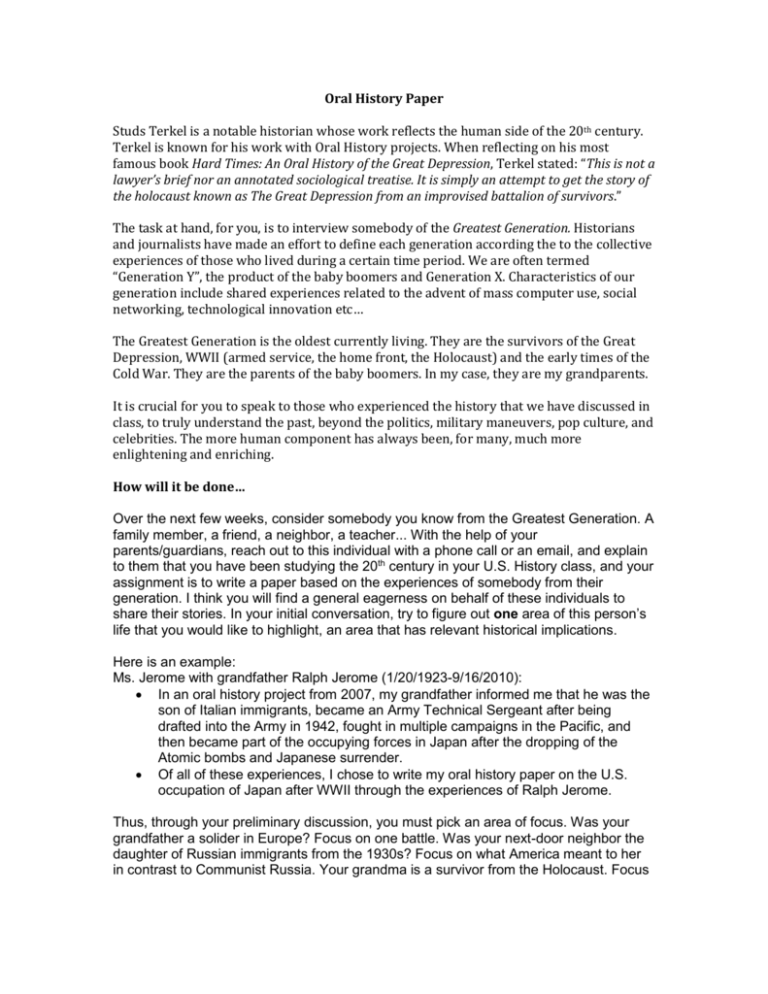
Oral History Paper Studs Terkel is a notable historian whose work reflects the human side of the 20th century. Terkel is known for his work with Oral History projects. When reflecting on his most famous book Hard Times: An Oral History of the Great Depression, Terkel stated: “This is not a lawyer’s brief nor an annotated sociological treatise. It is simply an attempt to get the story of the holocaust known as The Great Depression from an improvised battalion of survivors.” The task at hand, for you, is to interview somebody of the Greatest Generation. Historians and journalists have made an effort to define each generation according the to the collective experiences of those who lived during a certain time period. We are often termed “Generation Y”, the product of the baby boomers and Generation X. Characteristics of our generation include shared experiences related to the advent of mass computer use, social networking, technological innovation etc… The Greatest Generation is the oldest currently living. They are the survivors of the Great Depression, WWII (armed service, the home front, the Holocaust) and the early times of the Cold War. They are the parents of the baby boomers. In my case, they are my grandparents. It is crucial for you to speak to those who experienced the history that we have discussed in class, to truly understand the past, beyond the politics, military maneuvers, pop culture, and celebrities. The more human component has always been, for many, much more enlightening and enriching. How will it be done… Over the next few weeks, consider somebody you know from the Greatest Generation. A family member, a friend, a neighbor, a teacher... With the help of your parents/guardians, reach out to this individual with a phone call or an email, and explain to them that you have been studying the 20th century in your U.S. History class, and your assignment is to write a paper based on the experiences of somebody from their generation. I think you will find a general eagerness on behalf of these individuals to share their stories. In your initial conversation, try to figure out one area of this person’s life that you would like to highlight, an area that has relevant historical implications. Here is an example: Ms. Jerome with grandfather Ralph Jerome (1/20/1923-9/16/2010): In an oral history project from 2007, my grandfather informed me that he was the son of Italian immigrants, became an Army Technical Sergeant after being drafted into the Army in 1942, fought in multiple campaigns in the Pacific, and then became part of the occupying forces in Japan after the dropping of the Atomic bombs and Japanese surrender. Of all of these experiences, I chose to write my oral history paper on the U.S. occupation of Japan after WWII through the experiences of Ralph Jerome. Thus, through your preliminary discussion, you must pick an area of focus. Was your grandfather a solider in Europe? Focus on one battle. Was your next-door neighbor the daughter of Russian immigrants from the 1930s? Focus on what America meant to her in contrast to Communist Russia. Your grandma is a survivor from the Holocaust. Focus on one aspect of her experience. Be specific and try to find a topic with which you are familiar, based on what you learned in class so far. By April 5th—Choose a person and a topic for approval. Once you have decided on a topic on which you will focus, you must begin to research secondary sources regarding said topic. What are the facts that you should be aware of before you sit down to discuss with your interviewee? By May 4th—Choose a time and place of your interview (could be over the phone if this is the only option.) By May 11rd—To be handed in, 2 pages of researched information on your topic. Include a bibliography that includes at least 2 book sources and one Internet, non-encyclopedia source. Proper citations should be incorporated into your paper. By May 14th—A list of ten meaningful and poignant questions are to be submitted for my review. Questions should directly ask your person to reflect on specific areas of your topic in which you are interested. By May 23th—Conduct your interview. If they will permit, ask if you could record the interview for your use/purposes only. Attempt to ask all questions that you drafted up beforehand. However, also offer room for your person to speak at will—you will find much value in simply listening. By June 7 &8th— Completed paper. This is a 5-page oral history paper. To be completed in the proper MLA format. No late papers will be accepted. All papers must be printed and stapled before class. Don’t forget to properly cite your interview! Include: Title Page Paper Works Cited Appendix (if necessary) This paper should be about a specific area of history from the 20th century, as experienced by an individual who lived it. You are to contextualize this individual’s story through the incorporation of secondary sources. Use your interview as a source, thus using the proper format for quotations. Included in your paper should be at least a half a page on methodology.



